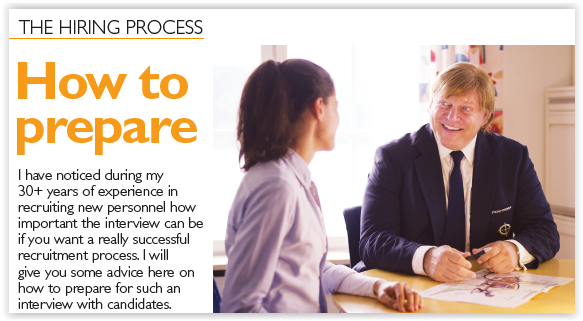
How to prepare
I have noticed during my 30+ years of experience in recruiting new personnel how important the interview can be if you want a really successful recruitment process. I will give you some advice here on how to prepare for such an interview with candidates.
Preparation:
- Read the candidate’s CV to quickly get an idea of what the candidate has been focusing on in his/her working career.
- Be prepared to take notes and do that, and simply that, throughout the interview.
- Note down all questions you might have from reading the CV. These questions can be a good warm-up to make the candidate comfortable, and it also demonstrates that you have an active interest in this particular person.
- When the candidate arrives, be ready to make things comfortable for him or her. Offer something to drink, demonstrate respect and decide to give your full attention to this individual. No company can afford bad manners on their hiring lines. The PR and word of mouth about your company depends on it to some degree. Have something to write down the candidate’s answers on. Be prepared to take notes.
- Decide to focus on getting a clear idea of the candidate’s actual past production and be willing to ask “dumb” questions in case you don’t understand something.
Interview:
- Realize that any candidate, whether great or not, has in fact taken the time to send you an application and travel to your office, and that demands some respect, no matter what. Just because there are few jobs available at the moment and lots of applicants, there is no reason to become arrogant. In a year from now the situation might be reversed. I repeat: It is much better to treat all candidates in a very respectful manner.
- Carefully observe the candidate and be interested in what the candidate is talking about; make sure you understand what is being said and acknowledge each answer after you understand it.
- Find out what the main reason was for applying to this position. (Was it personal interest or the need to do or learn something new, the urge to make more money, or any other reason, or is it a combination of different factors?)
- Give the candidate a quick orientation regarding your company and the position you are hiring for, and ask the candidate if he/she has any questions at this point.
- Ask some straight questions regarding his or her current job situation. Be curious and interested and focus on finding out about his or her production. What was contributed, how much and in what time, and who might be able to verify it.
- Avoid using questions that direct the candidate to an expected answer such as: “We are looking for someone who is quick, effective and service-oriented. How would you describe yourself?”
- If any question crosses your mind, or you start to become aware of something regarding the candidate during the interview, just ask about it. For example: If the candidate is nervous to the point where you notice it, just ask him “are you nervous?”; this should help to relieve the tension, and the candidate won’t have his attention focused on whether or not you have noticed his nervousness.
- If you have done a test and already have the test results, you can definitely ask questions based on that information. In the Performia hiring training, you can find lots of advice on how to do this effectively.
- Maintain a friendly yet professional attitude throughout the entire interview, and if you say you will get back to him or her with some information, make sure to keep that promise.